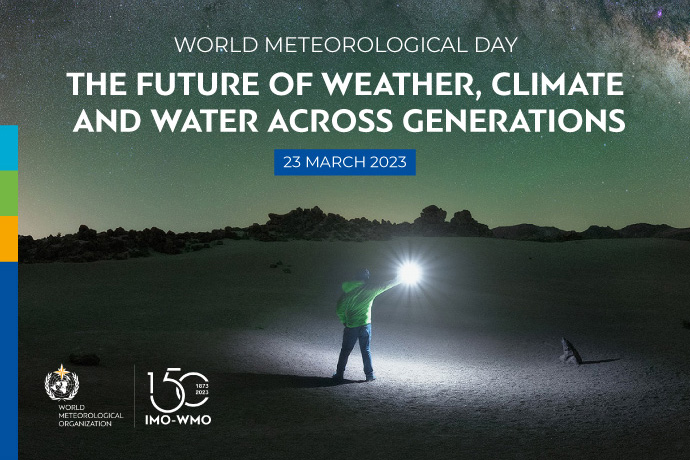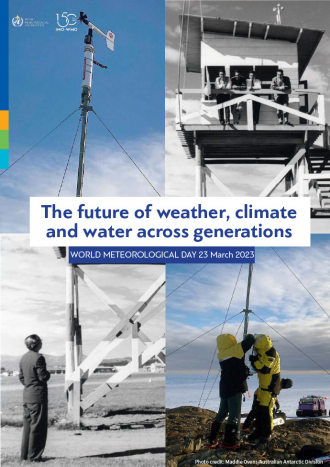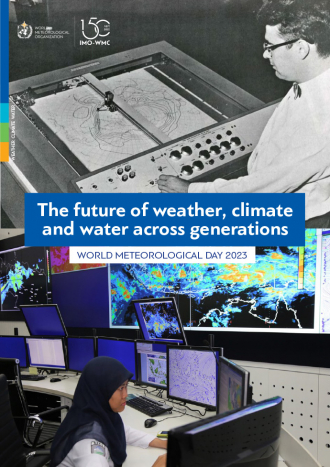


On the occasion of World Meteorological Day 2023, ECMWF Director of Forecasts Florian Pappenberger reflects on the importance of international collaboration for the future of weather, climate and water across generations.
March 23rd is the day every year when the whole meteorological community takes a moment to celebrate the World Meteorological Organization (WMO) and raise awareness of its activities. Why, at a time when severe weather and changes to our climate take so much of our time and our energy, should we stop to think about the WMO? Because a lot of what we do would not be possible without the WMO.
The WMO facilitates and promotes the establishment of an integrated Earth system observation network to provide weather, climate, and water-related data, as well as data management centres and telecommunication systems for the provision and rapid exchange of such data. It provides a platform for all meteorological services around the world. This role serves our whole community and is critical to its timely and accurate functioning.

The WMO plays a crucial role in the collection and exchange of Earth system observations. Image: WMO
Celebrating World Meteorological Day in 2023 is a very special opportunity. Whilst the WMO, which created that day to mark its creation under its current name, is only 63 years old, its predecessor, the International Meteorological Organization, was created in 1873. So 2023 in effect marks 150 years of the existence of such an organisation, albeit under two different names. And what an existence it has been.
The theme the WMO has chosen for this year’s World Meteorological Day is inspiring. ‘The future of weather, climate and water across generations’ is what unites our community.
It has far-reaching implications for human societies, ecosystems, and the planet as a whole. With the increasing frequency and intensity of extreme weather events, rising sea levels, and changing precipitation patterns, it is becoming increasingly urgent to develop sustainable strategies for managing the impacts of climate change. This is especially important when we consider the long-term consequences that current actions will have on future generations. It will require global cooperation, innovative technologies, and policies that prioritise the well-being of people and the planet to ensure that the world we leave is one that is sustainable and resilient.
When thinking about or planning for the future of weather and climate prediction, it can be tempting to focus on supercomputing, the Internet of things and scientific advances, and of course they are all paramount to progress. However, we would rather focus on what is and will continue to be key to our community success, and that is international collaboration. Scientific and technological advances are nothing if run in silos and kept to the benefit of one nation or one organisation. The past few decades have shown how much can be achieved when we work together, with our Member States and much beyond, and we can go so much further yet. We can explore further the talent and expertise that each nation can bring, we can learn from our nations’ geographical features and specificities, and we can share our cultural heritages for the benefit of all.

Advances in numerical weather forecasting are closely linked to advances in technology and supercomputing. Image: WMO
Meteorology is making increasing use of machine learning technologies. This could make the field more appealing and potentially more accessible to younger generations, who are increasingly tech savvy and data driven. The opportunity to drive progress in this area could present one way of helping to address the intergenerational inequality caused by man-made climate change.
The WMO and national hydro-meteorological services will continue to be crucial players in the future of weather, climate, and water across generations. Their expertise, data collection, and analysis will be essential for developing effective policies, strategies, and interventions to address the challenges posed by climate change and ensure sustainable development for all. ECMWF is proud to support the WMO.
WMO 150th anniversary video: a journey through the history of weather forecasting and international cooperation, highlighting the vital work of the world's meteorological community since 1873.
